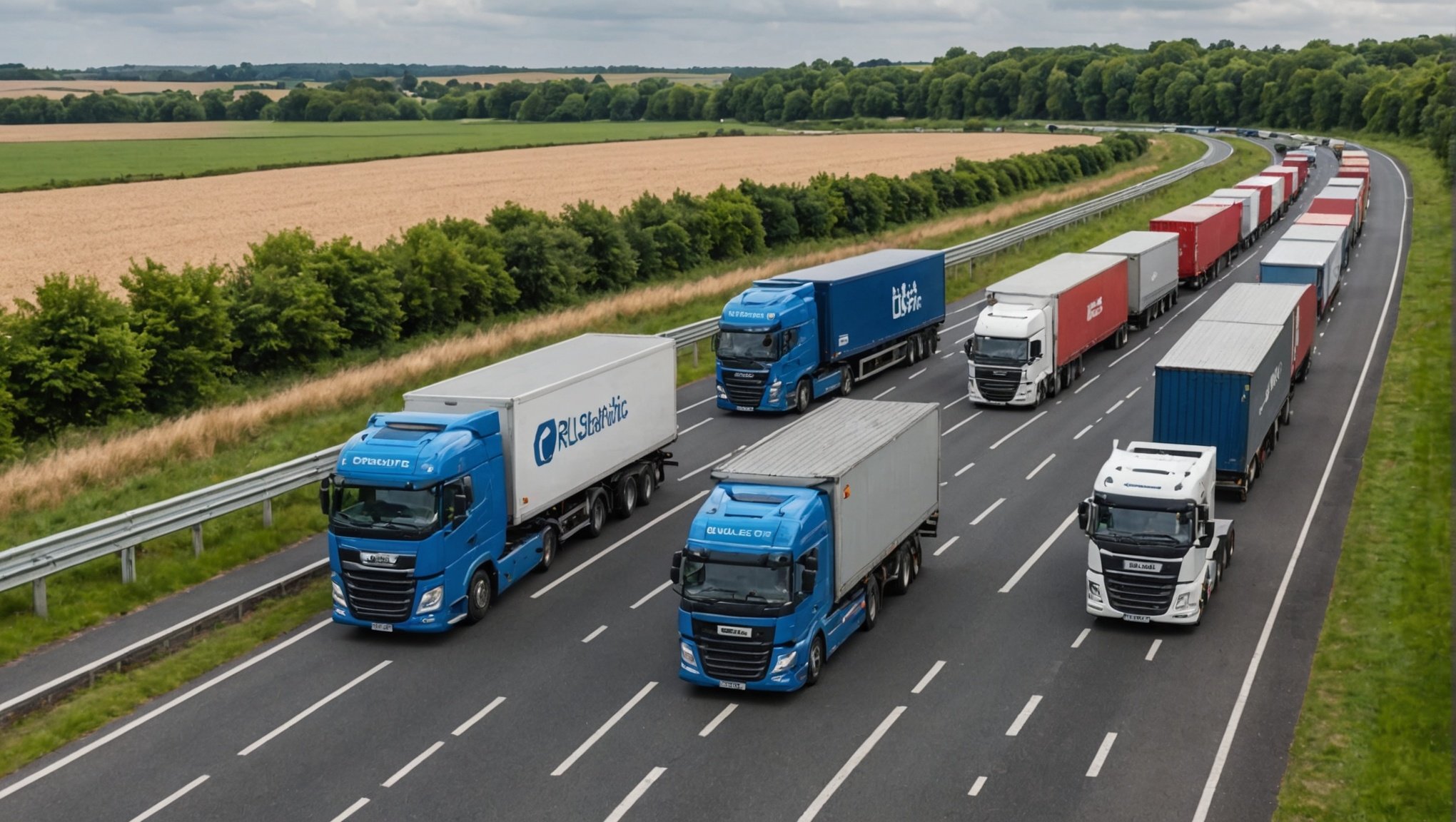The logistics industry in the UK faces mounting pressures to enhance efficiency and reduce costs. AI and machine learning emerge as powerful tools, transforming traditional route planning practices. By leveraging data-driven insights, businesses can optimize delivery routes, minimize fuel consumption, and improve customer satisfaction. Exploring innovative strategies can pave the way for increased operational effectiveness and a stronger competitive edge. Discover how incorporating these advanced technologies can revolutionize your logistics approach today.
Understanding AI and Machine Learning in Route Planning
In the realm of logistics, AI in logistics and machine learning optimization are revolutionizing how routes are planned and executed. These technologies leverage vast amounts of data to enhance decision-making processes, ensuring efficiency and cost-effectiveness in transportation networks.
This might interest you : Unlocking Efficiency: Strategies for UK Manufacturers to Harness 4IR Technologies
The core of this transformation lies in the ability of AI to process and analyze data at unprecedented speeds. Machine learning optimization utilizes algorithms that learn from historical data, identifying patterns and predicting optimal routes. This not only reduces fuel consumption and travel time but also improves delivery reliability.
Key algorithms in logistics include genetic algorithms, which mimic natural selection to find the best routes, and neural networks that model complex relationships within data. These tools are indispensable for companies aiming to streamline operations and respond dynamically to real-time changes in traffic and weather conditions.
Also to see : Enhancing Remote Learning in UK Schools: Innovative Uses of AR and VR Technology
The importance of data cannot be overstated. Accurate, real-time data feeds into these systems, allowing for continuous improvement and adaptation. As AI and machine learning technologies advance, their role in route planning will become even more critical, driving innovation and efficiency in the logistics industry.
Case Studies of AI Implementation in UK Logistics
Exploring AI success stories in the UK logistics sector reveals transformative impacts on route planning efficiency. Companies such as Ocado and DHL have successfully integrated AI technologies, showcasing remarkable improvements.
Analysis of Successful AI-Driven Logistics Companies in the UK
Ocado, a leading online supermarket, employs AI for optimizing delivery routes. By analyzing customer data and traffic patterns, Ocado has reduced delivery times and fuel consumption significantly. Similarly, DHL uses AI to enhance its logistics operations, achieving notable reductions in operational costs and delivery delays.
Specific Outcomes Observed in Route Planning Efficiency
AI implementation has led to measurable outcomes in the UK logistics industry. Companies report:
- Enhanced delivery accuracy and timeliness.
- Reduced environmental impact through lower emissions.
- Cost savings due to optimized resource allocation.
Lessons Learned from Case Studies
These case studies underscore the importance of investing in robust AI systems and continuous data analysis. Companies have learned that adaptability and real-time data integration are crucial for maintaining competitive advantages. Emphasizing these elements can lead to sustained improvements in logistics efficiency.
Practical Implementation Strategies
Integrating AI and machine learning into existing logistics systems can seem daunting, but with the right implementation tips, it becomes manageable. The first step is to assess your current infrastructure and identify areas where AI can add value. This often involves pinpointing inefficiencies in route planning and understanding how AI can address them.
Once you've identified these areas, the next step is to select the right tools and software for route optimization. Popular choices include platforms like OptimoRoute and Route4Me, which offer advanced algorithms to streamline logistics operations. These tools can help automate route planning, reduce travel times, and improve overall efficiency.
Data is the backbone of any AI system, so best practices for data collection and management are crucial. Ensure you have robust systems in place for gathering accurate, real-time data. This data should be continuously fed into your AI systems to facilitate learning and adaptation. Regularly updating your data management practices will help maintain the effectiveness of your AI integration.
Finally, fostering a culture of continuous learning and adaptation within your organization is vital. Encourage your team to stay informed about the latest AI developments and to experiment with new strategies. By doing so, you'll be better equipped to leverage the full potential of AI in your logistics operations.
Benefits of AI and Machine Learning in Route Optimization
Implementing AI and machine learning in logistics brings significant benefits of AI, particularly in route optimization. These technologies offer quantifiable improvements in operational efficiency by analyzing vast datasets to optimize routes, which in turn reduces travel time and fuel consumption. This leads to substantial cost savings and better resource management, as AI-driven systems can allocate resources more effectively, minimizing waste and maximizing output.
Moreover, the efficiency gains achieved through AI integration translate to enhanced customer satisfaction. With optimized delivery routes, companies can ensure more reliable and timely deliveries, meeting customer expectations consistently. This not only strengthens customer loyalty but also enhances the overall reputation of the service provider.
In summary, the benefits of AI in route optimization are manifold, driving efficiency gains, reducing costs, and boosting customer satisfaction, making it an indispensable tool in modern logistics.
Challenges in Adopting AI in Logistics
Adopting AI in logistics presents several adoption challenges that companies must navigate to harness the full potential of this technology. One of the primary barriers to AI integration is the significant initial investment required for technology and infrastructure upgrades. Many logistics companies, especially smaller ones, may find these costs prohibitive, impacting their ability to compete with larger players who can afford more advanced systems.
Another common obstacle is the resistance to change within organizations. Employees may be hesitant to adopt new technologies, fearing job displacement or a steep learning curve. This resistance can slow down the implementation process and reduce the effectiveness of AI systems.
To overcome these challenges, companies can focus on workforce training and change management. By investing in comprehensive training programs, companies can equip their employees with the necessary skills to work alongside AI technologies. This not only alleviates fears of redundancy but also empowers the workforce to leverage AI tools effectively.
Moreover, establishing a robust change management strategy is crucial. This involves clear communication about the benefits of AI, setting realistic expectations, and involving employees in the transition process. By fostering a culture of adaptability and continuous learning, companies can mitigate resistance and ensure a smoother integration of AI into their logistics operations.
In summary, while the adoption of AI in logistics comes with its set of challenges, addressing these through strategic investments in training and change management can pave the way for successful implementation.
Future Trends in Logistics Technology
In the ever-evolving landscape of logistics, the future of logistics is poised to be shaped by groundbreaking emerging technologies. As AI and machine learning continue to advance, their applications in logistics are expected to broaden significantly. Predictions indicate that these technologies will not only refine route planning but also introduce new dimensions of efficiency and accuracy.
Predictions for AI and Machine Learning in the Logistics Sector
The integration of AI and machine learning into logistics is anticipated to deepen, with systems becoming more autonomous and intelligent. Future advancements may lead to AI systems that can self-optimize in real-time, adapting to dynamic conditions without human intervention. This could revolutionize how logistics companies manage their operations, offering unprecedented levels of precision and efficiency.
Innovations on the Horizon
Several emerging technologies are on the brink of transforming route planning. Innovations such as quantum computing could drastically enhance data processing capabilities, allowing for more complex and rapid analysis of logistical data. Additionally, the Internet of Things (IoT) is expected to play a crucial role, with interconnected devices providing real-time data that AI systems can leverage to optimize routes continuously.
The Evolving Role of Technology in Logistics Efficiency
As these technologies evolve, their role in logistics efficiency will become increasingly central. Automation and robotics are likely to handle more routine tasks, freeing human resources for strategic decision-making. The future of logistics will be characterized by a seamless integration of technology, where AI-driven insights lead to more informed and agile logistics strategies. This evolution promises not only to enhance operational efficiency but also to redefine the logistics industry's competitive landscape.











